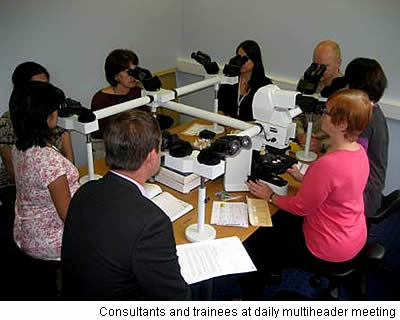Endorsements.
My training in Diagnostic Histopathology took longer than most because I combined specialist training with a Clinical Lectureship at the University of Sheffield. I had done a BMedSci in Pathology as an undergraduate and a CR-UK Clinical Research Fellowship after graduating so I jumped at the opportunity to mix academic activities with specialist training. For me the attraction of diagnostic histopathology is that the microscope really does allow one to see disease processes directly and every single slide offers a window into the root cause of the patient’s symptoms.
I gained funding from Yorkshire Cancer Research and other local charities, which enabled me to form a research group with 2 post-doctoral scientists and 3 BMedSci students. I’ve also collaborated with academics from the University’s Human Nutrition Unit, as well as other University teams. It is also important to get experience in District General Hospitals as well as specialist centres but the commute to both of the DGHs in our region is pretty easy. Chesterfield is within cycling distance if you are feeling energetic, and Doncaster is just 45 minutes away.
There are good state schools in the city, and both my children have been to the subsidised hospital nursery. We are very lucky to have the Peak District National park on the doorstep of the city.
There is no doubt that the FRCPath is tough, but the training is Sheffield is very good and we a have a good pass rate in the exams. I’m now a Consultant at Sheffield Teaching Hospitals NHS Foundation Trust, and Honorary Senior Lecturer at the University of Sheffield.
 Working in histopathology is a varied and interesting job, and day-to-day activities can differ throughout the working week. A typical day may begin with involvement in a multi-disciplinary team meeting, in which the trainee will discuss and present cases that they themselves may have reported. Other mornings may start with a post-mortem (autopsy) examination, either for the Coroner or as a hospital case.
Working in histopathology is a varied and interesting job, and day-to-day activities can differ throughout the working week. A typical day may begin with involvement in a multi-disciplinary team meeting, in which the trainee will discuss and present cases that they themselves may have reported. Other mornings may start with a post-mortem (autopsy) examination, either for the Coroner or as a hospital case.
Following this, most mornings involve specimen cut-up, in which surgical cases are examined grossly before selected blocks are taken for histological analysis. These blocks are specifically chosen to represent certain features of a lesion, such as maximum depth of invasion in tumours. Cut-up cases can be varied, ranging from small skin specimens sent from general practice, to major specialist cancer resection specimens.
The remainder of the working day is mainly used to examine slides under the microscope, where a diagnosis will be formulated and a report produced. There is an opportunity to use extra investigations such as special stains and immunohistochemistry in order to further characterise lesions. Some specialities may require the interpretation of more complex techniques such as immunofluorescence and fluorescent in-situ hybridisation (FISH).
Throughout the day, the registrar may be required to assist in handling a frozen section, in which a specimen will be sent fresh for urgent analysis. These cases are reported whilst surgery is still ongoing, meaning that the opinion of the histopathologist will have a direct influence on the surgical procedure.
Other common roles include presenting interesting cases at departmental “black box” sessions, conducting audit and research work, teaching medical students and attending study days and courses.
The Sheffield Histopathology rotation is a compact, well structured training programme providing excellent training in all areas of histopathology including specialist areas like Paediatric, Neuro and Ophthalmic pathology. The general FRCPath teaching programme is organised to the highest standards consistently through term times.
I subspecialised in Paediatric and Perinatal Histopathology and spent the last two years of my training in Sheffield Children's Hospital. The Paediatric Histopathology department has a highly qualified and experienced team of Pathologists and I am very delighted to have joined this team recently as a consultant. The training is comprehensive and there are many opportunities for audit, research and management activities.
Training in Sheffield has been an enjoyable experience. It is a compact rotation with rotations in teaching and district general hospitals. There is a good exposure to a wide variety of surgical specimens with ample opportunities for hands-on experience in cut-up. There is a dedicated FRCPath teaching programme and very good autopsy and non-gynaecological cytology experience.
Although I have elected not to practice in the UK, I know the experience has equipped me for the future.